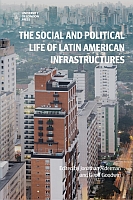The Social and Political Life of Latin American Infrastructures
Contributor(s)
Alderman, Jonathan (editor)
Goodwin, Geoff (editor)
Language
EnglishAbstract
From houses to roads, infrastructures offer a unique lens through which to explore social and political change. Serving as an important conduit between states and citizens, infrastructures provide governments with a powerful tool to mould subjects and control populations. Yet, at the same time they also give individuals, communities, and movements a platform to challenge the state and forge alternative forms of citizenship and politics. Infrastructures therefore shape social and political relations in unexpected ways and never dutifully follow the scripts of politicians, bureaucrats, and engineers. Latin America provides fertile terrain to explore these issues. The region has been subject to extensive foreign intervention for centuries and much of its infrastructure has primarily been constructed to benefit colonial and imperial powers. Yet Latin America has also seen widespread resistance to colonial-capitalist expansion, and infrastructures have been central to these diverse struggles. Drawing on recent empirical research, this cross-disciplinary book demonstrates the value of analysing social and political change through infrastructure. The authors explore a diverse range of Latin American infrastructures, from a sparkling new tram network in Ecuador to a crumbling old nuclear plant in Cuba. Building on the empirical chapters, the editors demonstrate the value of conceptualising infrastructure as a relational and experimental process. In addition to making a novel contribution to global infrastructure debates, the volume offers important new insights into Latin American history, society, and politics.


 Download
Download